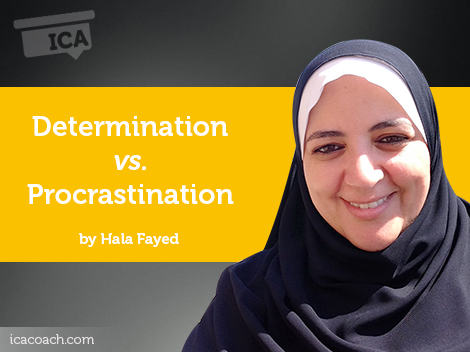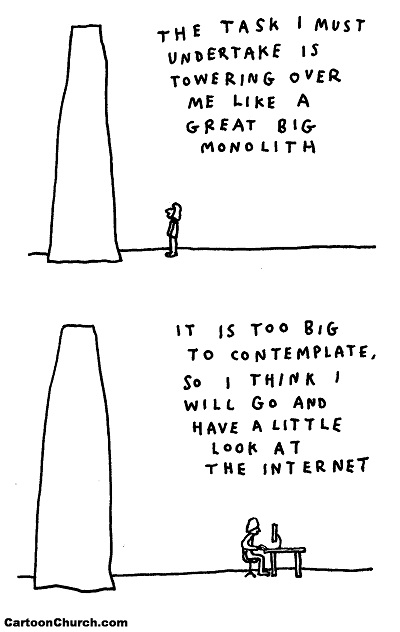
A Coaching Power Tool Created by Hala Fayed
(Family and Life Coach, KUWAIT)
Determination in a picture:
 Procrastination in a picture:
Procrastination in a picture:
Introduction:
Deciding whether to procrastinate or be determined is simply a personal choice; a choice that has a great impact on the person’s progress towards a goal.
The difference between the impossible and the possible lies in a person’s determination. – Tommy Lasorda
Sometimes, with the lack of awareness and mindfulness, when we deeply want to achieve a goal and work so hard on having a clear strategy to achieve it, midway we either stop or lose direction. That’s why determination is so important because it is the cornerstone to enjoy the sense of accomplishment and achievement in life.
What Determination and Procrastination actually mean:
According to Merriam Webster Dictionary:
Determination is:
- a quality that makes you continue trying to do or achieve something that is difficult
- the act of finding out or calculating something
- the act of officially deciding something
Procrastination is:
- to be slow or late about doing something that should be done
- to delay doing something until a later time because you do not want to do it, because you are lazy, etc.
Why do people procrastinate?
Bonnie Mincu, founder of Thrive with ADD, in her Procrastination Transformation Key, came to a conclusion that when people don’t commit themselves to achieve a goal, they are either unmotivated and don’t feel like it (Procrastinating), like the case with boring or difficult tasks; Or, they get mentally stuck or unable to move forward (Paralyzed), like the case when there is something needed to be done first, or the person feels anxious or uncomfortable doing the task, or even don’t know how to proceed.
Bonnie says that it is very important to identify why we put off doing (or even have struggle starting) a task in order to be able to overcome this road-bump and carry on with our achievements.
On the other hand, James R Sherman, in his book Stop Procrastinating, gives a list of 15 major causes behind procrastination: confusion, lack of priorities, lack of responsibility, fear of risk-taking, escape from unpleasant task, anxiety or depression, obsessive/compulsive behavior, boredom, fatigue, outside distractions, lack of analytical ability, forgetfulness, dependence on others, manipulation of others, or physical disabilities. These reasons are somehow similar to the reasons given by Bonnie Mincu but not as categorized.
What makes people determined?
There are many factors that make people determined whether positive factors such as their purpose and motivations, or negative factors such as their fears.
As for the motivations, people who know their goals clearly and remind themselves of why they want to achieve those goals, i.e. know their purpose, then they set clear plans to achieve those goals, are more determined than those who depend on luck, or don’t even know what they want in the first place.
On the other hand, people avoid any kind of pain, which makes them sometimes be more determined as a way to face the fear of pain.
Both factors play a big role in helping people be determined.
Coaching Application
As coaches, we can help clients overcome procrastination and be determined by changing their perspective about their goals, helping them see clearly the purpose behind each goal and work with them hand in hand on setting a clear plan making sure to follow through. Also, we can work together on identifying why the clients are procrastinating or getting stuck.
On the other hand, as coaches, we can take advantage of the fears that the clients might have in order to help them face the fear of pain and then achieve their goals.
While procrastination is unintentional, or as it is sarcastically said: procrastination is the intention to do nothing, determination is about consistency in doing specific tasks until main goal is achieved.
Both are related to the mindset.
The coach’s role lies in helping the client:
- Identify the symptoms. Sometimes, the client just feels the frustration of not getting things done (or not even being able to get started) without knowing that they are procrastinating. They just suffer from feeling overwhelmed.
- Determine the reasons behind this procrastination.
- Set a clear plan with the client to get things done.
- Commit to doing something NOW!
Why Plan?
A written plan, or even just a checklist, helps in focusing on the target, and help in re-focusing in case of any distraction.
How to Plan?
a. Daily write a plan the night before, or early in the morning
- Work with a clean desk/area. Putting the most important task before us so that we can focus all of our attention on that task without other visual distractions.
- Breakdown big projects into small tasks.
- Set timers. Commit yourself to just 10 or 20 minutes on working on a task even if you don’t complete it.
- Be ready for interruptions. This helps in making it easier to go back to the task at hand.
- Assign deadlines. Create a deadline and you will be moved to action.
Simple Laser Coaching Session technique:
With the client who is feeling overwhelmed and not going anywhere, it is important to follow the BARR technique (below), then ask, what can you do right now?
The client needs to be reminded that at any situation where we work really hard to achieve something and we get stuck midway, it is important to remember that our actions are our choice, i.e., we choose what we do. So what do you choose to do right now?
Using the BARR technique (created by Hala Fayed):
- Breath
- Accept the fact that you slacked or you are stuck.
- Remember that you choose your action, and
- Replace the ineffective action with an effective one.
Powerful Questions
- What are you putting off doing? Letters, studies, reports, calls, projects, books, exercise, etc.
- What are the reasons behind putting off each task?
- How can you use positive affirmations and visualization as helping tools on keeping you committed to your plan?
- How did you achieve your goals in the past?
- Are you putting more than one goal on hold, or just this goal in particular?
- Are there any other goals that you did achieve?
- What helped you achieve those goals?
- How can you use this to motivate you in this current goal that you are working all?
How to stay committed and consistent on a goal:
Also, the coach can help the client be determined and stay committed by asking the following questions:
- What are the results of getting the tasks done?
- What would you feel when you get this task done?
- What does it mean to you?
- How can your personal strengths help you stay on the task until it is completed?
- Whose help can assist you get things done?
- What will happen if you DON’T achieve the goal?
- How will you feel if you don’t achieve it?
Determination vs. procrastination as a Coach
At the end of a coaching session, it is very important for the coach to finish the session leaving the client feeling clear and present about their goal, regardless of the result, whether the client completes the goal afterwards or not. But what makes the sessions even more successful is when the coach agrees with the client on a follow through plan and follows up on a daily basis by all means (whether short messages, calls, emails, etc.). This step gives the client a sense of support from the coach’s side and progress from their side. It also gives the coach a sense of achievement that the main purpose of the coaching relationship is being met.
Reflections and Self Application:
- Think of a goal you have been putting off.
- How do you feel about that? What did you try (or not try) to do so far?
- Consider a time when you were able to achieve a difficult goal.
- What made you work on that goal, were there any techniques that you followed to achieve the goal? What were your motivators? What were your fears?
- How can you use that information in helping you stay consistent on this current goal?
As said earlier:
The difference between the impossible and the possible lies in a person’s determination. Tommy Lasorda
Resources:
http://www.merriam-webster.com/dictionary/
Procrastination Transformation™ Key, by Bonnie Mincu, www.thrivewithadd.com
Image from : http://knote.com/2014/11/25/how-to-stop-procrastinating-for-good-hint-it-doesnt-involve-a-productivity-app/
Sherman, James R., PhD, “Stop Procrastinating: Get to Work!”
